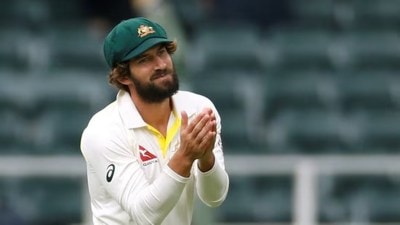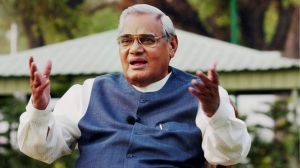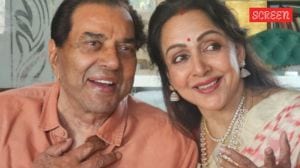Behind BJP-JD(S) coalition move: Lost ground, south Karnataka seats, Modi-Gowda goodwill
The Congress, which has been sitting pretty after clinching the Assembly elections, has likened the proposed BJP-JD(S) alliance for 2024 Lok Sabha polls to ‘two sinking swimmers trying to cling on to each other’
 (L-R) PM Narendra Modi and former PM H D Deve Gowda.
(L-R) PM Narendra Modi and former PM H D Deve Gowda. When political parties decide to forge alliances ahead of an election it is usually dictated by the need for expansion of their respective political bases besides being an acknowledgement of the existence of a formidable rival in the fray.
The Janata Dal (Secular)’s proposal to tie up with the BJP for the 2024 parliamentary polls is an indication that the two parties have come to accept the reality of their fractured support bases in Karnataka in the aftermath of the 2023 state Assembly polls, which was won comprehensively by the Congress.
The JD(S)’s bid also indicated that the BJP, which lost power in the state, has doubts about whether Prime Minister Narendra Modi alone can clinch the 2024 polls for the party in the absence of a strong local leadership.
Their proposed move is an opportunity for the BJP to make up for the failure to nurture a strong leadership by banking on the JD(S) to rally its vote base in the state, especially in the south Karnataka region, for the alliance.
The BJP, which won eight of 11 seats in south Karnataka (and 25 of 28 seats in the state) in the 2019 Lok Sabha polls, is hoping that in the 2024 polls the “Modi magic” coupled with the JD(S)’s caste arithmetic would make up for the loss of ground the party suffered over the last few years.
For the JDS, which is struggling to stay afloat after its worst-ever performance in the 2023 polls, the alliance with the BJP offers a lifeline for survival.
The Congress, which is sitting pretty after winning 135 of 224 seats in the Assembly polls, has likened the proposed BJP-JD(S) alliance to “two sinking swimmers trying to cling on to each other”.
In the 2019 Lok Sabha polls, the JDS had an alliance with its then ruling coalition partner, the Congress, in the 7:21 ratio for the state’s total 28 seats but they were swept aside in the Modi wave, which led to the BJP winning 25 seats with the two allies managing to win just one each.
While alliances tend to look good on paper as a merger of the strengths of two parties they are also fraught with danger as the rationale for the alliance is often not clear to party workers who have spent years seeing the new allies as bitter rivals.
Despite the JD(S) and the Congress sharing common socialist and secular ideologies and looking like natural allies on paper, the workers of the two parties went into disarray on the field in the 2019 polls, turning against each others’ candidates. The BJP had then swept seats in Bombay Karnataka, Hyderabad Karnataka, coastal Karnataka, central Karnataka — and even southern Karnataka, where the Congress-JD(S) coalition was considered to be the most formidable.
The 2019 elections saw several Congress and JD(S) stalwarts losing their seats. The JD(S) supremo and ex-Prime Minister, H D Deve Gowda, lost in Tumkur, senior Congress leaders, Mallikarjun Kharge, Veerappa Moily and K H Muniyappa, lost in Kalaburagi, Chikkaballapur and Kolar respectively. The BJP won 51.7 per cent of votes as against the Congress’s 32.1 per cent votes and the JD(S)’s 9.7 per cent votes.
Unlike the 2019 Congress-JD(S) alliance, the currently proposed tie-up between the BJP and the JD(S) seems to be a better electoral match despite the obvious differences in their respective right-wing and left-of-centre ideologies.
With Modi and Deve Gowda being the central figures in forging the proposed alliance through their mutual goodwill and cordial relations, the coalition is expected to bring together supporters of Modi – cutting across party and caste lines – and the large Vokkaliga caste base in south Karnataka, which considers Gowda and his son H D Kumaraswamy, the ex-chief minister, as their patriarchs.
Acknowledging his recent meeting with PM Modi on seat-sharing, Gowda said earlier this week that he had not placed any demand on the BJP for the number of seats the JDS wanted to contest . “I explained the situation in each constituency (of Karnataka) to the PM,” he said.
An early indication of the progress in the BJP-JD(S) attempts to forge an alliance came in August-end when Kumaraswamy announced that he had “advised Nikhil (his son) to stay away from politics” and that “there is no question of him (Nikhil) contesting elections for the next five years”.
The fielding of Deve Gowda’s grandsons Nikhil Kumaraswamy and Prajwal Revanna along with him for the 2019 polls was seen as a key factor in the JD(S)’s debacle then. With Modi taking a stand against dynastic politics, the JD(S) was thus believed to have cleared the air regarding its intent to ally with the BJP for the 2024 polls.
While senior BJP leader and ex-CM B S Yediyurappa has said that the JD(S) will contest four and the BJP the remaining 24 seats in the 2024 polls, the JD(S) leadership has indicated that the sharing of seats has not been decided yet.
The JD(S) has its support base in the 11 south Karnataka seats while the BJP is considered strong in the 17 seats in north, central and coastal Karnataka due to the support for PM Modi and the backing of the large Lingayat community based in the northern districts.
In the 2014 Lok Sabha polls, the BJP got 43.37 per cent of votes to win 17 seats (mostly in the north) on the back of the Modi factor while the Congress polled 41.15 per cent of the votes and won nine seats. The JD(S) polled 11.07 per cent and won two seats in south Karnataka.
In the 2023 Assembly polls, the Congress won 43 per cent of votes and 135 seats, the BJP won 36 per cent votes and 66 seats, and the JD(S) won 13 percent votes and 19 seats. The JD(S)’s performance was thus at its worst since 1999 when it had plummeted to 10 seats from a high of 115 seats in 1994 with a dip in vote share from 33.54 per cent to 10.42 per cent.
Deve Gowda also said this week that the JD(S)’s support can tilt the balance in favour of the BJP in many northern districts in a direct fight with the Congress. The BJP can win in constituencies outside south Karnataka – such as Vijayapura, Raichur and Chikkamagaluru – only if JD(S) backs the BJP candidates, he said.
The BJP-JD(S) alliance is not a new development. Deve Gowda has enjoyed a cordial relationship with Modi for long, with the two often making it a point to greet each other on social media on special occasions. The JD(S) has helped the BJP tactically on many occasions in the Karnataka Legislature and outside.
The JD(S) views the forging of an alliance with the BJP during the lifetime of Gowda, who is now 90, as crucial in the light of successive poll setbacks since 2018.
Although Gowda has been reluctant to move away from the secular ideology he has been wedded to through his political innings, Kumaraswamy has had no such qualms and has been keen on encashing the Modi-Gowda goodwill, especially in view of the weakening of both their parties after the 2023 polls.
In 2006, the JD(S) had joined hands with the BJP — a decision that was said to be against the wishes of Gowda — that led to Kumaraswamy becoming the CM. Their alliance fell through in 2007 after the JD(S) did not transfer power to the BJP.
“Ours is a regional party and we are trying our best to survive. There has been a coalition with the BJP on one occasion and there has been a coalition with the Congress on another occasion. We have the experience of both sides. We want to fight independently and take up important issues facing the state of Karnataka,” Deve Gowda had said in 2021 when he was perceived as moving closer to the BJP after a failed coalition experiment with the Congress.
With the Congress not being keen on having the JD(S) in the INDIA alliance on account of their conflicting electoral interests in south Karnataka, the JD(S) is believed to have seen the current political scenario as an opportune moment to seal a poll alliance with the BJP.
After returning to Bengaluru from Delhi Thursday, Yediyurappa said there were no discussions on the JD(S)-BJP alliance at the party’s Central Election Committee meeting, adding that he did not know what was on the minds of PM Modi and Home Minister Amit Shah.
“There was no time to discuss other issues amid the discussions on the polls. They did not raise other issues and we also did raise other issues. We don’t know what is on the minds of Modiji and Amit Shah. There were no discussions regarding Karnataka,” Yediyurappa said. “If there are any decisions that will be taken then there will be consultations with us. There have however been no such discussions,” he said.
The BJP’s ex-CM Basavaraj Bommai however suggested that the discussions on the alliance will progress after the special five-day Parliament sessions called from September 18 by the Modi government. “There have been no discussions yet on constituencies and seat sharing. In the coming days there will be discussions. After the Parliament session the senior leaders will hold consultations with all of us – this is the expectation,” Bommai said.
- 01
- 02
- 03
- 04
- 05































